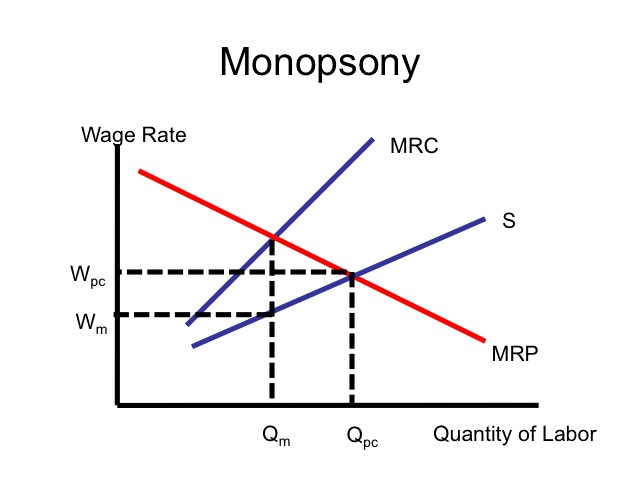Re: Study: The 2007 minimum wage hike cost more than 1 million jobs during the recess
Pay attention: Traditional monopsony refers to a single buyer, ensuring an upward sloping labor supply curve. The dynamic approach allows us to drop the "single buyer" assumption, as incomplete information of job vacancies, which is a feature in the MW labor market, ensures the the same upward sloping labor supply curve.
Yeah, got that, which is why my reply referenced and then pointed out the problems with assuming sharp wage-related information asymmetries, not to mention unique purchaser collusion.
That is what monopsony infers; that the labor supply curve for the market is identical to that of the hiring firm.
If a labor supply curve is upsloping, that means that you will need to offer higher wages in order to attract additional workers, if you want to attract additional workers. Demand for labor is elastic (which you have argued as I recall is actually a good thing in this regards, as it increases the relative incentive for investment in capital). I'd look with a jaundiced eye at the claim that that is our unique driver in this market, as opposed to considering opportunity costs such as leisure, or competition from off the books labor. There is absolutely slack in the Low Skill Labor force.
I was unaware you were interviewing for minimum wage jobs via glassdoor.com. My comment pertained to the LS/LW labor market, not your anecdotal journey through frictional unemployment.
:shrug: Had I been interviewing for low-skill jobs I would have had the same resources available - I wouldn't have interviewed at Wal-Mart without knowing what K-Mart was paying, and visa versa. Had I been interviewing at Chik Fil A I would have compared them to Zaxby's.
That is correct, it is not.
Here we see demand side factors influencing the price of low skilled jobs, ensuring that particular labor market (South Dakota frack towns) will exhibit an inelastic labor supply curve, thereby eliminating the wage making ability of the employer.
Not eliminating. Reducing. This is a slope that never reaches either axis.
However, on the reverse slide of the slope, you are confusing "competition among wage earners" for something that is solely a firm function. A larger supply of labor relative to demand is not a monopsony.
I cannot comment on behalf of your discussion with others.
That is interesting to see you say, given that this discussion started with you doing precisely that - the post you responded to was my response to Dittohead Not.
You clearly lack exposure to labor economics, which you continue to wear on your sleeve with each reply. Why not swallow your pride and try to learn something?
I have no problem learning - quite the opposite. It is in fact, a large part of why I come here.

You merely confuse your comfort with the terminology with the status of automatically being the smartest person in any room you walk into (a common affliction), which is unfortunately why you overbite. It's not exactly like any of this stuff is rocket surgery.
 We lie to ourselves and the result is that we do damage to our poor, but inversely, feel good about it.
We lie to ourselves and the result is that we do damage to our poor, but inversely, feel good about it.

